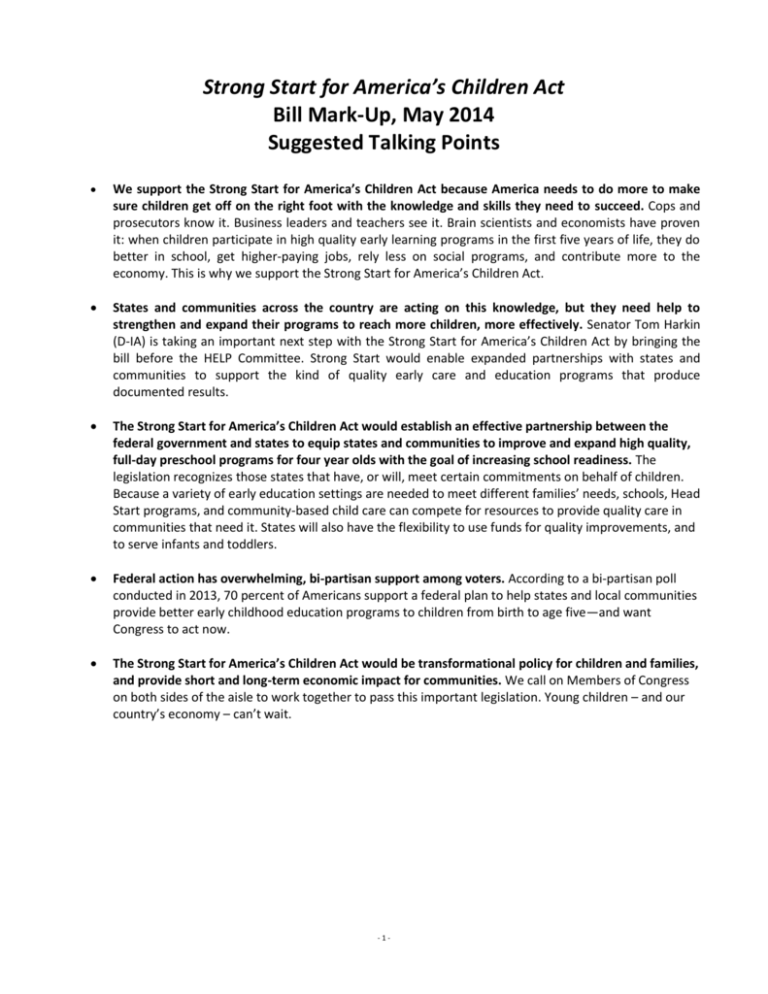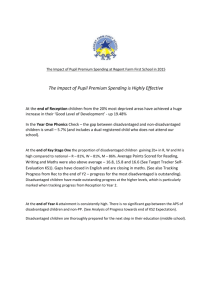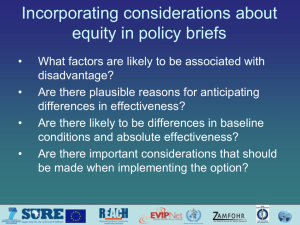Strong Start for America's Children Act Bill Mark
advertisement

Strong Start for America’s Children Act Bill Mark-Up, May 2014 Suggested Talking Points We support the Strong Start for America’s Children Act because America needs to do more to make sure children get off on the right foot with the knowledge and skills they need to succeed. Cops and prosecutors know it. Business leaders and teachers see it. Brain scientists and economists have proven it: when children participate in high quality early learning programs in the first five years of life, they do better in school, get higher-paying jobs, rely less on social programs, and contribute more to the economy. This is why we support the Strong Start for America’s Children Act. States and communities across the country are acting on this knowledge, but they need help to strengthen and expand their programs to reach more children, more effectively. Senator Tom Harkin (D-IA) is taking an important next step with the Strong Start for America’s Children Act by bringing the bill before the HELP Committee. Strong Start would enable expanded partnerships with states and communities to support the kind of quality early care and education programs that produce documented results. The Strong Start for America’s Children Act would establish an effective partnership between the federal government and states to equip states and communities to improve and expand high quality, full-day preschool programs for four year olds with the goal of increasing school readiness. The legislation recognizes those states that have, or will, meet certain commitments on behalf of children. Because a variety of early education settings are needed to meet different families’ needs, schools, Head Start programs, and community-based child care can compete for resources to provide quality care in communities that need it. States will also have the flexibility to use funds for quality improvements, and to serve infants and toddlers. Federal action has overwhelming, bi-partisan support among voters. According to a bi-partisan poll conducted in 2013, 70 percent of Americans support a federal plan to help states and local communities provide better early childhood education programs to children from birth to age five—and want Congress to act now. The Strong Start for America’s Children Act would be transformational policy for children and families, and provide short and long-term economic impact for communities. We call on Members of Congress on both sides of the aisle to work together to pass this important legislation. Young children – and our country’s economy – can’t wait. -1- Strong Start for America’s Children Act Bill Mark-Up, May 2014 Suggested Talking Points Making the Case High quality early childhood education for disadvantaged children is an important investment in our nation’s economic future. It improves health; reduces the need for special education, educational remediation and welfare; reduces high school dropout, juvenile justice and incarceration rates; increases home ownership, employment and economic productivity. A solid body of research shows that gaps in cognitive, social and emotional skills open at birth, get larger and are difficult to close. A recent study by Stanford University found gaps between disadvantaged and more affluent children opening up as early as 24 months. Hart & Risley show that these widen into huge gaps in vocabulary by age five. These make it difficult for disadvantaged children to read proficiently by 3rd grade, and ultimately do well in school and compete later in life. Early deficits in skills persist into adult skill deficits that have economic consequences for individuals, taxpayers and America’s economy. Quality early childhood programs help us prevent the skills deficit, while providing a greater return on taxpayer investment through better education, health, social and economic outcomes. In fact, quality early childhood programs for disadvantaged children more than pay for themselves, providing a 7-10% return on investment per year, per child, compounding throughout the lifetime of each child. Across the country, in “red” states and “blue” states from Alabama to Washington, state legislatures have prioritized early learning funding despite tough economic times and reduced revenue. States are doing a lot, but they can’t do it alone. Strong Start for America’s Children provides resources to help states and communities provide evidence-based early education to low and moderate income children age birth to five. -2-











